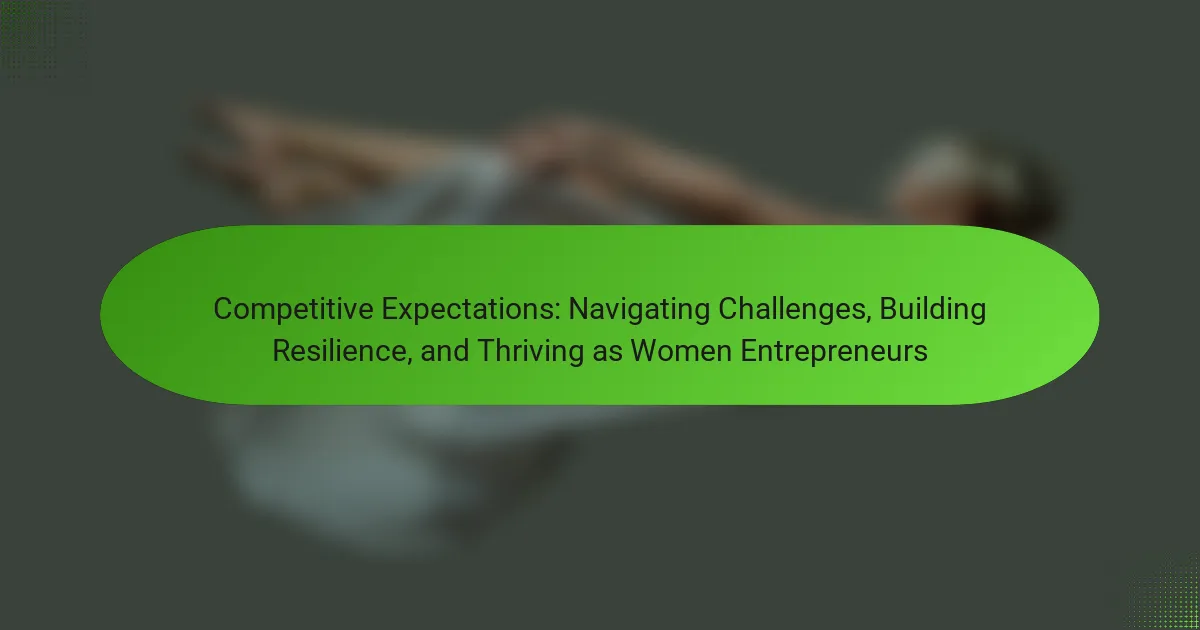Women entrepreneurs often face significant challenges, including funding disparities and balancing personal responsibilities. Faith empowers them to overcome these obstacles with confidence and purpose. This article explores how a strong belief system fosters resilience, the importance of supportive networks, and best practices for sustainable growth. By emphasizing collaboration and social impact, women-led businesses can thrive and create meaningful change.

How does faith empower women entrepreneurs to lead with confidence and purpose?
Faith empowers women entrepreneurs by instilling confidence and purpose, enabling them to overcome challenges. This empowerment often stems from a strong belief system that fosters resilience, community support, and a clear vision. Faith encourages women to pursue their goals with determination, transforming obstacles into opportunities for growth. Research shows that spiritually grounded entrepreneurs report higher levels of satisfaction and motivation, reinforcing their leadership qualities. Ultimately, faith serves as a powerful catalyst for women to lead with authenticity and impact.
What role does personal belief play in entrepreneurial success?
Personal belief significantly influences entrepreneurial success by fostering resilience and driving motivation. Women entrepreneurs often draw strength from their faith, which empowers them to overcome challenges and pursue their goals with confidence. Research indicates that entrepreneurs with strong personal beliefs are more likely to persist in the face of setbacks, enhancing their chances of success. Furthermore, belief in a greater purpose can inspire innovative solutions and attract supportive networks, essential for business growth.
How can community support enhance women’s leadership?
Community support significantly enhances women’s leadership by fostering confidence and providing essential resources. It creates networks where women entrepreneurs can share experiences and gain mentorship. These connections empower women to lead with purpose, enhancing their visibility and impact in various sectors. Research shows that women in supportive communities are more likely to pursue leadership roles, as they feel validated and encouraged. Additionally, community initiatives often provide funding opportunities and training programs tailored for women, addressing unique challenges they face in entrepreneurship.
What are effective networking strategies for women entrepreneurs?
Effective networking strategies for women entrepreneurs include building authentic relationships, leveraging social media, and joining supportive communities. Focus on creating meaningful connections rather than just exchanging business cards. Engaging on platforms like LinkedIn can enhance visibility and access to opportunities. Participating in women-focused networks fosters collaboration and mentorship, empowering women to lead with confidence and purpose.
How can mentorship shape the journey of aspiring women leaders?
Mentorship significantly shapes the journey of aspiring women leaders by providing guidance, support, and confidence. Mentors offer valuable insights, helping women navigate challenges and make informed decisions. This relationship fosters personal growth and resilience, essential for effective leadership. Mentorship programs focused on women entrepreneurs can enhance skills and expand networks, creating opportunities for collaboration. As a result, women gain the confidence to lead with purpose and authenticity, driving positive change in their communities.

What are the unique challenges faced by women entrepreneurs?
Women entrepreneurs face unique challenges including access to funding, balancing work and family, and overcoming societal biases. These hurdles can hinder their growth and confidence. Research shows that women-led businesses receive significantly less venture capital compared to male counterparts, highlighting funding disparities. Additionally, women often juggle caregiving responsibilities, impacting their ability to dedicate time to business ventures. Addressing these issues requires supportive networks and targeted resources to empower women entrepreneurs.
How do societal expectations impact women in business?
Societal expectations often impose limitations on women in business, affecting their confidence and leadership potential. These expectations can manifest as stereotypes, influencing perceptions of women’s capabilities. As a result, women may face challenges in accessing opportunities, resources, and support. Studies show that women entrepreneurs often navigate a landscape shaped by both external pressures and internalized beliefs, which can hinder their growth and success. Encouragingly, initiatives that promote mentorship and community support can help women overcome these barriers, fostering a culture of empowerment and confidence.
What barriers prevent women from reaching leadership positions?
Barriers preventing women from reaching leadership positions include gender bias, lack of mentorship, and work-life balance challenges. These factors hinder women’s advancement and confidence in leadership roles. Gender bias manifests in stereotypes and unequal opportunities, while insufficient mentorship limits guidance and support. Additionally, balancing professional and personal responsibilities often poses significant challenges for women aspiring to leadership. Addressing these barriers is crucial for fostering an inclusive environment that empowers women entrepreneurs to lead with confidence and purpose.

What rare attributes contribute to the success of women-led businesses?
Women-led businesses thrive due to unique attributes like resilience, community focus, and innovative problem-solving. These qualities foster strong networks and adaptability, contributing to long-term success. Research shows that women entrepreneurs often prioritize collaboration over competition, creating supportive ecosystems. Additionally, their emphasis on social responsibility aligns with growing consumer demand for ethical business practices.
How does emotional intelligence influence leadership styles?
Emotional intelligence significantly shapes leadership styles by enhancing self-awareness, empathy, and interpersonal skills. Leaders with high emotional intelligence inspire confidence and foster a collaborative environment. They recognize team dynamics and adapt their approach to meet individual needs, resulting in increased motivation and productivity. This adaptability is a unique attribute that empowers women entrepreneurs to lead with purpose. Emotional intelligence also facilitates effective communication, allowing leaders to articulate vision and values clearly, thus reinforcing a culture of trust and respect.
What innovative approaches are women entrepreneurs using to stand out?
Women entrepreneurs are leveraging innovative approaches such as community-driven initiatives, digital storytelling, and sustainable practices to distinguish themselves. These strategies foster authentic connections and highlight their unique values. Community engagement builds strong networks, while digital platforms amplify their voices. Sustainability not only attracts conscious consumers but also aligns with their purpose-driven missions. As a result, these methods empower women to lead with confidence and purpose, creating a lasting impact in their industries.
How can storytelling be used as a business strategy?
Storytelling can effectively enhance business strategy by fostering emotional connections with customers. It allows women entrepreneurs to communicate their values, mission, and vision authentically. By sharing personal narratives, they can inspire confidence and purpose, engaging their audience more deeply. This approach builds brand loyalty and differentiates their offerings in a competitive market. Additionally, storytelling can convey complex ideas simply, making it easier for customers to understand the benefits of products or services. Emphasizing relatable experiences can also motivate other women to pursue entrepreneurial endeavors.
What are the benefits of collaborative leadership among women?
Collaborative leadership among women fosters empowerment, inclusivity, and innovation. Women leaders create supportive networks that enhance communication and trust. This leadership style encourages diverse perspectives, leading to more creative problem-solving. Additionally, it boosts confidence and purpose among women entrepreneurs, driving them to pursue their goals with determination.

What are the core features of successful women-led initiatives?
Successful women-led initiatives emphasize empowerment, collaboration, and social impact. Key features include strong leadership, community engagement, mentorship programs, and innovative problem-solving. These initiatives often prioritize sustainability and inclusivity, addressing diverse needs while fostering a supportive environment. Research shows that women-led businesses tend to perform better in terms of employee satisfaction and retention.
How do mission-driven businesses create impact?
Mission-driven businesses create impact by aligning their operations with social and environmental goals. These companies often prioritize community engagement, sustainable practices, and ethical sourcing. For instance, they empower women entrepreneurs by providing resources and mentorship, fostering confidence and purpose. The unique attribute of these businesses is their commitment to measurable outcomes, such as improved local economies and increased access to education. As a result, mission-driven enterprises not only achieve financial success but also contribute positively to society.
What financial strategies empower women entrepreneurs?
Financial strategies that empower women entrepreneurs include building a strong network, leveraging mentorship, and accessing funding opportunities. Establishing connections enhances collaboration and resource sharing. Mentorship provides guidance and confidence. Diverse funding sources, including grants and microloans, support business growth. Women-led businesses that adopt these strategies often experience increased success and sustainability.
What funding options are available for women-led startups?
Women-led startups can access various funding options, including grants, venture capital, crowdfunding, and angel investors. Grants specifically designed for women entrepreneurs often provide non-repayable funds. Venture capital firms increasingly focus on supporting diverse founders, while crowdfunding platforms allow women to showcase their ideas to a broad audience. Angel investors can offer mentorship alongside financial support, enhancing growth potential. These options empower women to lead with confidence and purpose in their entrepreneurial endeavors.
How can women entrepreneurs leverage grants and scholarships?
Women entrepreneurs can leverage grants and scholarships to access funding and resources essential for business growth. These financial aids can help cover startup costs, training, and operational expenses, allowing women to focus on their vision.
Research indicates that women-led businesses receive significantly less venture capital compared to male counterparts, highlighting the importance of alternative funding sources. Grants and scholarships specifically aimed at women entrepreneurs can bridge this gap, empowering them to lead with confidence and purpose.
Additionally, many organizations offer mentorship programs alongside financial support, enhancing the overall value of these opportunities. Engaging with networks that provide grants can also lead to collaborations and partnerships, further expanding business potential.
In summary, utilizing grants and scholarships not only provides financial relief but also fosters a supportive community for women entrepreneurs, encouraging them to pursue their ambitions.

What best practices can women entrepreneurs adopt for sustainable growth?
Women entrepreneurs can adopt best practices such as building a strong network, leveraging mentorship, and embracing digital tools for sustainable growth. Establishing connections with other entrepreneurs fosters collaboration and support. Mentorship provides guidance and insights from experienced leaders, enhancing decision-making. Utilizing digital tools streamlines operations and expands market reach, crucial for scalability. These strategies empower women to lead with confidence and purpose, driving long-term success.
How can women balance personal and professional responsibilities?
Women can balance personal and professional responsibilities by prioritizing their time and setting clear boundaries. Effective time management is essential. Utilizing tools like calendars and to-do lists helps in organizing tasks. Additionally, seeking support from family and colleagues fosters a collaborative environment. Embracing flexibility allows women to adapt to changing circumstances. Cultivating a strong network of fellow entrepreneurs provides inspiration and shared experiences. By leading with confidence and purpose, women can navigate challenges while achieving their goals.
What common mistakes should women avoid in their entrepreneurial journey?
Women entrepreneurs should avoid common mistakes that can hinder their success. Key pitfalls include underestimating their value, neglecting networking, and failing to seek mentorship.
1. Underestimating value: Many women struggle with imposter syndrome, doubting their abilities and contributions. Recognizing their worth is crucial for confidence.
2. Neglecting networking: Building relationships is essential for growth. Women should actively engage with peers and industry leaders to expand opportunities.
3. Failing to seek mentorship: Guidance from experienced mentors can provide valuable insights and support. Women should prioritize finding mentors who align with their goals.
4. Avoiding risk: Fear of failure can stifle innovation. Embracing calculated risks is important for entrepreneurial growth.
5. Ignoring self-care: Balancing work and personal life is vital. Women should prioritize their well-being to maintain productivity and creativity.
By being aware of these mistakes, women can lead their entrepreneurial journeys with confidence and purpose.
How can continuous learning and adaptation drive success?
Continuous learning and adaptation empower women entrepreneurs to lead confidently and purposefully. By embracing new skills and insights, they enhance decision-making and innovation. This commitment fosters resilience in a dynamic market, ultimately driving business success. Women who continuously adapt are more likely to seize opportunities and overcome challenges. Research shows that organizations prioritizing learning outperform their competitors by 30%. Emphasizing adaptability cultivates a growth mindset, essential for long-term achievement.
What expert insights can guide women in business towards growth?
Women in business can grow by embracing confidence and purpose in their leadership. Expert insights emphasize the importance of mentorship, networking, and continuous learning. For instance, studies show that women-led businesses often excel when supported by strong mentorship relationships, enhancing both personal and professional growth. Additionally, fostering a network of like-minded entrepreneurs can lead to valuable collaborations and opportunities. Engaging in lifelong learning helps women adapt to market changes and innovate effectively. By integrating these strategies, women entrepreneurs can navigate challenges and achieve sustainable growth.



